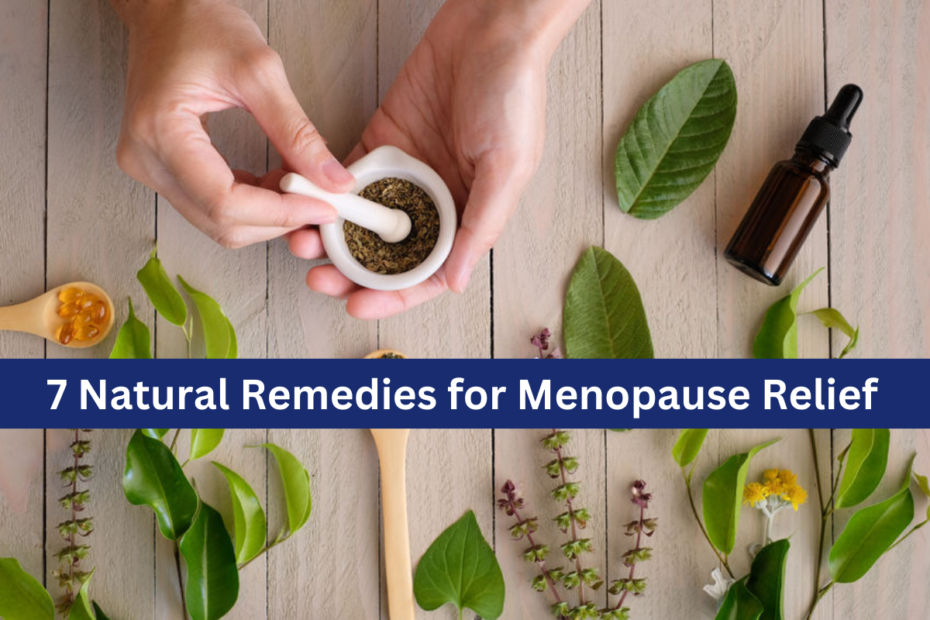7 Natural Remedies for Menopause Relief: The menopause is a crucial milestone in a woman’s life, and it is frequently accompanied by symptoms such as hot flashes, mood swings, and sleep difficulties.
Many women look to natural solutions in order to alleviate their symptoms, despite the fact that hormone replacement therapy (HRT) is a frequent medication available. In order to alleviate the discomfort associated with menopause, here are seven excellent natural strategies:
Phytoestrogens
Plant substances that imitate the effects of estrogen in the body are referred to as phytoestrogens. They have the ability to restore hormonal equilibrium and reduce symptoms such as hot flashes.
Tofu, tempeh, and soy milk are all examples of foods that are high in phytoestrogens. Flaxseeds, lentils, and soy products are further examples.
There is a possibility that including these in your diet will assist support hormonal balance and lessen symptoms associated with menopause.
Black Cohosh
Black cohosh is a herb that has been used for centuries to alleviate the symptoms of menopause, including hot flashes, nocturnal sweats, and mood swings from menopause.
It has been shown by studies that it can help lessen the frequency of hot flashes as well as their intensity.
In spite of this, it is imperative that black cohosh be utilized under the supervision of a qualified medical practitioner, as it has the potential to mix with other medications and may not be appropriate for all individuals.
Red Clover
Another form of phytoestrogen, isoflavones, can be found in red clover and other plants. It is frequently utilized for the treatment of hot flashes and for the improvement of menopausal symptoms in general.
There are many different preparations of red clover that may be purchased, such as teas, supplements, and tinctures. A conversation about its use with a healthcare expert is beneficial since it allows you to decide the appropriate dosage and ensures that it is safe for you to consume.
Also see : Sphinx Moths, the Stars of the Evening Garden
Regular Exercise
Participating in regular physical activity has the potential to considerably alleviate the symptoms of menopause. Maintaining a healthy weight, regulating mood, and reducing stress are all benefits of regular exercise.
Exercises such as brisk walking, swimming, and yoga are particularly useful in this regard. In addition, physical activity is beneficial to bone health, which is especially important during menopause because of the increased risk of osteoporosis.
Healthy Diet
A well-balanced diet that is abundant in fruits, vegetables, whole grains, and lean meats is beneficial to one’s general health and has the potential to reduce the symptoms of menopause.
For optimal bone health, it is especially important to consume foods that are rich in calcium and vitamin D.
The consumption of omega-3 fatty acids, which may be obtained from foods such as flaxseeds, walnuts, and fatty fish, can also be beneficial in the treatment of mood swings and inflammation.
Mindfulness and Stress Reduction
The menopause is a time that can be stressful, and it is essential to manage stress in order to alleviate symptoms.
Reducing stress and improving emotional well-being can be accomplished through the practice of yoga, and other practices such as mindfulness meditation and deep breathing techniques.
The practice of mindfulness on a regular basis can also help with sleep difficulties and mood swings, providing a holistic approach to the management of menopause symptoms.
Herbal Teas
It is possible for certain herbal teas to have a calming effect and assist in the management of menopausal symptoms. For instance, chamomile tea can help with sleep and relaxation, and peppermint tea may be helpful for hot flashes.
Both of these teas are available. In addition, evening primrose oil, which is typically taken in capsule form, is thought to help maintain hormonal equilibrium and alleviate the symptoms of menopause.
Conclusion
It can be difficult to navigate the menopause, but natural therapies offer a number of strategies to ease symptoms and enhance general well-being by providing relief from these symptoms.
A considerable change can be achieved by incorporating phytoestrogens, herbal supplements, regular exercise, and a nutritious diet into one’s wellness routine.
Before beginning a new supplement or making a significant change to your lifestyle, you should always get the advice of a qualified medical practitioner to confirm that the supplement or modification is suitable for your specific health requirements.
You may find that adopting these natural ways makes it easier and more comfortable for you to handle the symptoms of menopause.
